2018-19 hockey

Hockey's season went out with a whimper as they were swept at the hands of Minnesota in the first round of the Big Ten tournament. That's disappointing but not particularly surprising for anyone who watched most of Michigan's season.
What went wrong? Michigan's various problems follow.
Age
Michigan was one of the youngest teams in the country, and the bottom of the age standings are pretty ugly:
ND and Denver are in the top 16 of the pairwise. Otherwise this is a list of the teams that generally recruit the best across college hockey and are struggling in the new over-30 NCAA. Not one of Minnesota, Michigan, BC, BU, or Wisconsin is in position for an at-large bid. It should be noted that 50-52 are Quinnipiac, Providence, and Harvard, who are all set for at-large bids, but even those teams in close proximity by rank are almost a half-year older than Michigan and the rest of the "we recruit the NTDP" class.
Under Pearson they've moved to taking more overagers, but those guys are all underclassmen. Michigan is in the process of having some 23 and 24 year olds; they are not there yet. At some point Michigan's going to be a mix of older players and high-level NHL prospects. Currently they are young and had 1.5 high-level prospects. Speaking of:
Talent level
Norris was M's only PPG scorer and missed half the year [Bill Rapai]
As discussed in the previous post about Michigan's gap year, this year's freshman class had zero drafted players for the first time in probably 20 years. Michigan found a good fourth line as Moyle and Van Whye emerged midseason; that line then became their de facto second line because nobody else was doing anything. Compounding matters was the previous class, which was Hughes and Norris (woot woot!) plus Mike Pastujov, whose star fell precipitously after his commitment, and then whatever Mel could scrape up. That turned out to be Becker and Raabe, two guys who have chipped in but aren't scoring line players at this point in their career.
So when Norris goes out midseason, they have zero underclassman forwards capable of playing on a scoring line. This is untenable for a program that is constantly getting raided by the NHL—you aren't getting Cooper Marody back for a senior year.
Michigan did have some guys: Lockwood put up 31 points in 36 games; Slaker and Pastujov put up 25 and 24. It's not a coincidence that two of the three top scorers were older draftees. There just weren't enough of them. Michigan has always been more talented than all of its opponents, which is how they make up the perpetual age gap. This year they weren't. Opposing goaltenders put up a .914; Michigan was 41st in shooting percentage. Even more telling: Michigan's power play conversion rate nearly halved from 19% (average-ish) to 10% (national worst) when Norris went out.
[After THE JUMP: woe! fie and woe!]
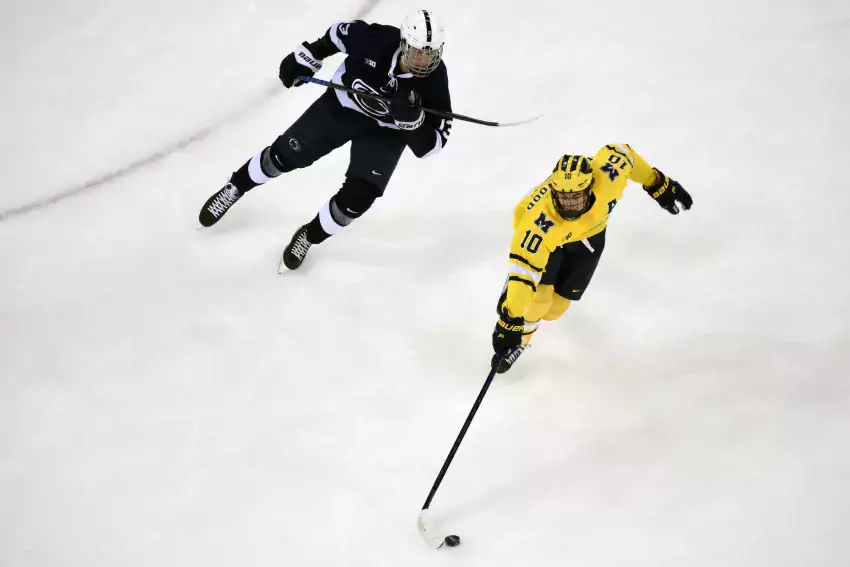
Another weekend, another split, another missed opportunity to stop the wheels from spinning and gain ground on a possible at-large tournament berth. In broad strokes, Michigan played to their 2019 standard in this weekend’s series with Penn State. After beating #6 Notre Dame on the road, Michigan dropped a home game to lowly Merrimack. After eking out a 2-1 win over #4 Ohio State, Michigan dropped the second game, 4-2. Then a 5-1 win over #15 Penn State got Michigan close enough to cracking the Pairwise top 20 that David was considering penning a rooting guide for this weekend’s games only to have those plans shelved after a 5-2 loss in the series finale.
It would stand to reason, then, that there must be two different version of Michigan Jekyll-and-Hyde-ing its way through the season, but the team that won handily Thursday and the one that got blown out Saturday are much more similar than different: periods of excellent shot generation, some stagnation where good teams get shots against M in clusters, and occasional difficulty exiting the defensive zone that’s related to the second point. Every game features a period or two where Michigan dominates, and more often than not it’s via forechecking pressure that leads to offensive opportunities. The one thing that seems to change is attention to detail; when Michigan’s engaged, they’re difficult to stop, and when they’re disengaged they’re likely to serve up supercilious turnovers, the kind that arrive at your table with an extra server, present the food from the left side only, and make a show out of rotating the plate. (If I got that wrong blame Google.)
Michigan got out to a sluggish start on Thursday night, allowing Penn State a Corsi-dominant first period (58% possession, 10 of 25 shot attempts from the House) before flipping the script in the second period (56% possession, seven of 19 shot attempts from the House). Michigan ended the second period up 4-0 and was able to drop guys back defensively and wait out the final 20 minutes. On Saturday, Michigan was four struck posts away from a series sweep—if not for a half dozen preventable turnovers. Michigan’s offense was excellent in the first period, its 30 attempts what was statistically its best period of shot generation of the series, including an impressive 14 from the House area in front of the net. Michigan ended that period down 3-0, though, and went down 4-0 within two minutes of the start of the second period. Drawing iron and seemingly every turnover being converted into a Penn State goal took the life out of Michigan, and they mustered a paltry 36% possession in the second period. A frame where Michigan dominates offensively and ends up down three goals with emotions torpedoed deserves a closer look, as does the manner in which Michigan coughed up the puck.
[Hit THE JUMP to see if there are common threads in Michigan’s post shots and turnovers]
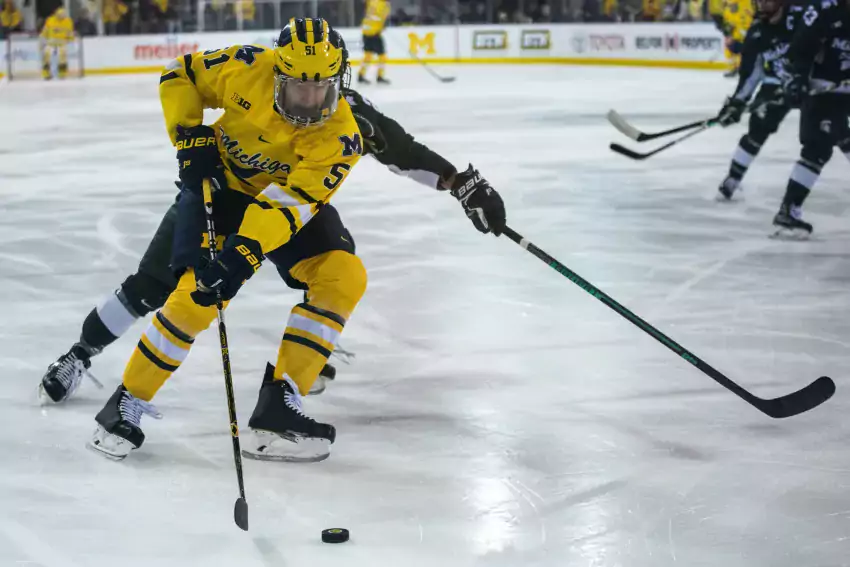
What Happened? Michigan ground out a 2-1 win against #4 Ohio State in Columbus Friday night, then fell 4-2 to the Buckeyes (one goal was an empty-netter, so meh) on Saturday.
*Blank stare* Okay, yeah, context. Michigan beat Notre Dame in an outdoor game at Notre Dame Stadium January 5th for what appeared to be a win that could propel them to a second half akin to last season’s, then looked like a completely disinterested team during a rare Tuesday night game against Merrimack (the team, not the boat). Friday night’s win again left some hope for a second-half run, then Saturday night’s game… actually, Michigan didn’t look that bad Saturday night, either. There’s hope yet.
Things don’t look great from a Pairwise perspective, though. A cursory glance at the comparisons chart doesn’t reveal one big thing Michigan could do to make a move. They only have 11 games remaining and have to come as close to running the table as possible to steal some comparison points back. That would help, at least as long as the general volatility of the conference continues unabated; the top two teams, Ohio State and Minnesota, are 6-3-3 in conference play and third-place Michigan is 4-5-4. Beating Penn State in their next series (this weekend is a bye) would be a nice start, as Michigan is currently tied for the head-to-head comparison point. (If you’re looking for a Pairwise explainer, USCHO has a good one here.)
So this is another one of those years where Michigan has to win the conference tournament to earn a bid and gets matched up with Penn State, isn’t it? Sort of looks that way.
Anything to take from last weekend that might give us insight into what could happen during the stretch run? Seems like the kind of thing we should put after THE JUMP, no?
[Hit THE JUMP for weekend takeaways that might give insight into the stretch run]
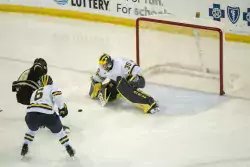
Looking at the ongoing competition between Hayden Lavigne and Strauss Mann
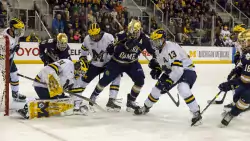
A look at where 5v5 shots are coming from and why they're going in

A mix of bad luck and long bombs leaves Michigan with a lot of shot attempts and fewer goals than you would expect to show for it
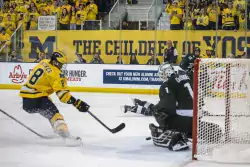
A look at even-strength scoring and the power play from hockey's first half
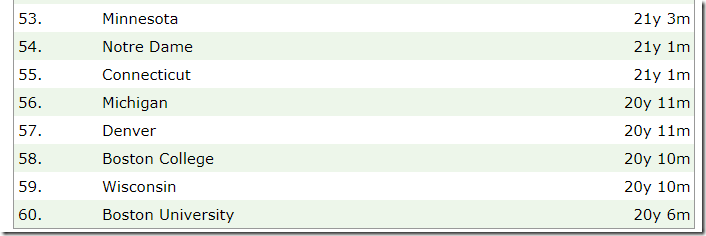
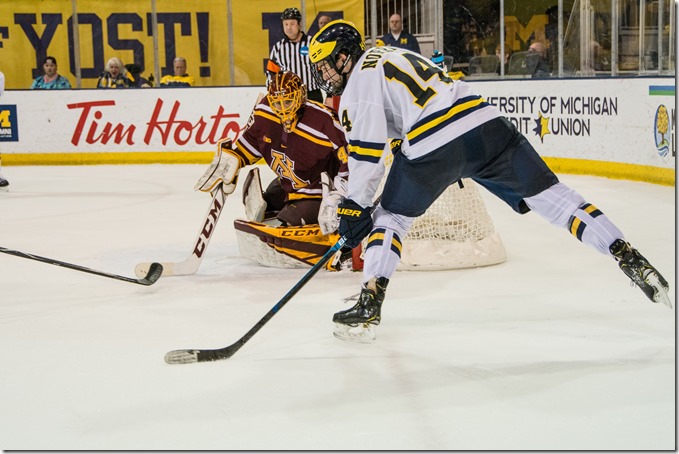
11